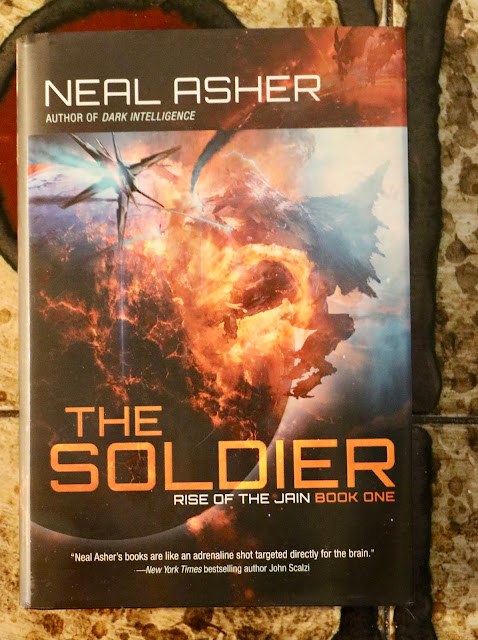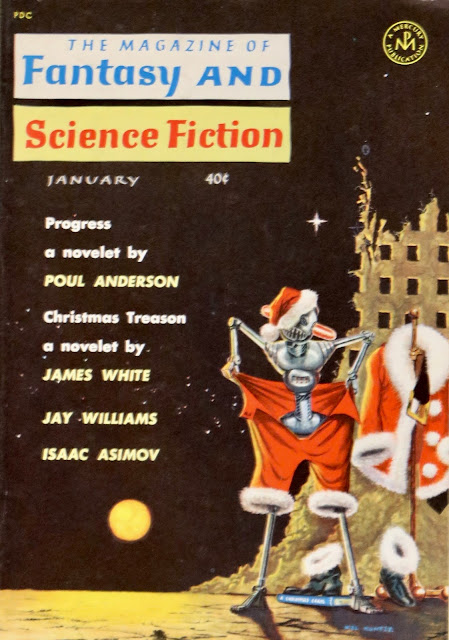Yesterday I had a productive reading day even if not everything was a gem. Typically I only discuss works I like, but in this post, I wanted to include everything I read. The first item was a short story by Harry Harrison. I read his novel Deathworld as a teen, but nothing else as far as I can remember. I have collected a lot of his books over the years, so I wanted to start. I picked his collection 50 in 50 years ago when my library still sold discards. I chose "Down to Earth" based on a cover illustration of a space capsule for its appearance in Amazing Stories, November 1963.
This story concerns the first Apollo landing on the moon. During the initial exploration, one of the astronauts Glazer falls into a crevasse concealed by the thick coating of dust. His companion Gino Lombardi tries to rescue him but is unsuccessful. Gino then completed his assigned work and contacted the pilot of the orbiting ship Danton Coye.
"Glazer is dead. I'm alone. I have all the data and photographs required. Permission requested to cut this stay shorter than planned. No need for a whole day down here." (165)
Gino's somewhat callous response could be dismissed as the result of shock. He does break down later on the ship back to Earth, but the reaction concerning Glazer's death does indicate a problem I had with the entire story. The dialogue, the description, just seemed flat, unemotional and unembellished.
The story itself gets rolling when they return to Earth and find themselves in an alternate timeline. The story was okay, the most interesting part for me occurs when Albert Einstein, still alive in this timeline offers them a cure for some of the worse cancers in exchange for weapons to use against the Nazis. Still not an auspicious start, but Harrison has a huge body of work, and this collection alone covers 50 years.
Nest I decided on some more Moorcock, I read "The Jade Man's Eyes", one of his stories about Elric of Melniboné. " Elric is the last emperor of the stagnating island civilization of Melniboné. Physically weak and frail, the albino Elric must use drugs (special herbs) to maintain his health."
I have read several of Moorcock's Eternal Champion stories in the past. Most recently, I have been reading the stories of Dorian Hawkmoon, Duke of Köln. I am finding the Hawkmoon stories quite formulaic and the character one dimensional. Elric was much more interesting in part because he is unpredictable. His magical broadsword Stormbringer is often uncontrollable, and his demonic patron, Arioch unreliable. In this story, Elric and his companion Moonglum are enlisted by the noble Duke Avan Astran to accompany him on a treasure-hunting expedition to the ancestral island of Elric's people. This type of quest is a staple of the sword and sorcery set, but I found Moorcock's a step above. The threats and responses were more interesting; the pacing moved the plot along without rushing.
Also, Moorcok's style reminds me of some of my favourite fantasists like Eric Rücker Eddison, Lord Dunsany, Clarke Ashton Smith and Robert Howard.
" It happened that one springtime two strange men came to Chalal. They rode their weary Shazaian horses along the quays of marble and lapis lazuli beside the fast-flowing river. One was very tall, with a paper white skin, crimson eyes and hair the color of milk, and he carried a huge, scabbarded broadsword at his side." (57)
or
"One of those legends speaks of a city older than dreaming Omrryr." (61)
Moorcock is quite honest about his influences in creating the character of Elric of Melniboné; they seem quite wide-ranging; his comments appear here.
As I said earlier, Moorcock's Eternal Champion interests me, and I will be exploring it and Elric in greater detail.
Joachim Boaz at Science Fiction and Other Suspect Ruminations mentioned he had obtained a copy of the anthology Orbit 11.
One of the stories mentioned on the back caught my attention.
"TO PLANT A SEED. Is many really master of the Universe? In this brilliantly conceived story, an incredible project is launched to preserve the human race—not only from the death of Earth’s sun billions of years in the future… but from the ultimate collapse of the entire Universe itself!"
Since I had the book, I read the story by Hank Davis. Two scientists Cullins and Cain, are seeking funding for a seed ship. Using a McJunkins Field, which slows time, they will encase a spaceship containing human volunteers. The humans will not age within the field. The plan is that they will remain in stasis as the universe winds down and collapses. Then, when the next big bang occurs, they can seed the new universe with humans. (Characters in the story do mention how wrong this is.) This story could have been interesting, but it isn't. It interspersed the action, such as it is, with transcripts, news feeds and exchanges taking the form of questions and answers between characters with an omnipresent viewpoint concerning the activities of Cullens and Cain. There was little character development, but a fair bit of technical explanations/lectures, some reminded me of high school math. The main problem is that it is incredibly sexist bordering on hateful. Most of it is directed at Cullin's girlfriend, Erika. Cain does try to date one of his female colleagues, but she is never named. Oddly, Davis invests so much space in a short story in underscoring the misogyny of his central characters. I am in no hurry to read more by him.
I like Brian Stableford. I covered his story "The Growth of the House of Usher here."
I enjoyed the first novel of his Hooded Swan collection and hope to cover the entire series at some point. I also want to post on Sherlock Holmes and the Vampires of Eternity for my HPL blog but the length makes it a bit daunting. I have also purchased a number of his translations of early french science fiction/roman scientifique.

So when I noticed Journey to the Center on a trip to the basement yesterday, I picked it up. Michael Rousseau is a freelance scavenger on the planet Asgard. The planet is controlled by a humanoid race called the Tetron. However, a number of other races, including Terrans, live there. The planet lost its atmosphere in the distant past. The native race burrowed into the surface then disappeared, leaving behind many uninhabited levels. The alien races on Asgard explore these levels looking for artifacts they can sell. There are two groups the Consolidated Research Establishment composed of many races who work in a highly structured manner. Then there are freelancers, both groups and individuals like Rousseau. Rousseau's problems begin when the Tetron Immigration Authority contacts him, asking that he show a new earth immigrant the ropes. This is a common practice on Asgard members of one race are asked to look after new members of the same race. Rousseau is due to leave on a scavenging trip and suggests his friend Saul Lyndrach to look after Myrlin the new arrival. Then things go south Saul and Myrlin disappear, and Rousseau is framed for murder by Amara Guur, the criminal kingpin on Asgard. Under Tetrax law, criminals are sold into contact slavery. Guur wants Rousseau to lead an expedition into the planet.

But before Rousseau can sign the documents, Starship captain Susarma Lear and her stormtroopers show up and conscript Rousseau. The Terrans have just won a vicious war (about which Rousseau knows virtually nothing) in which they basically wiped out another species. Now the war is over, and there is only one loose end. Myrlin is not human but an android created by the enemy, and they have to kill him. And all this occurs by page 47.
I love this stuff. We have anthropology with Rousseau's Tetrax lawyer explaining that contract slavery is the highest form of civilization, higher even than capitalism because it controls the efforts of so many individuals. We have interesting descriptions of the planet and the possible explanations for its current state. There is a nod to a panspermia explanation for the races we see on Asgard. There is a nearby Black Galaxy (dust cloud), which will eventually cover most of the spiral arm. Is Asgard a small Dyson sphere that was built first and then had a small sun ignited inside? Is Asgard a ship that transported its population out of Black Galaxy? Using Rousseau Stableford is obviously playing with lots of ideas, and I enjoyed all of it. He also packs a lot into 153 pages. Rousseau is a very stereotypical loner/rebel found in SF. Still, here he is an excellent foil to the "starship troopers" (Stableford's actual term to describe the soldiers that accompany Lear). That said Lear is not a cardboard martinet, she is a strong, smart capable woman, nice to see in SF. I also enjoyed the resolution.
Stableford dedicated "For Lionel Fanthorpe-a kindred spirit" Fanthrope was the leading light of Badger Books.
In his work Stableford explores biology, biotechnology, big dumb objects and a mixture of ideas from roman scientifique, the planetary romance and even the weird tale. I find this a nice change from the libertarian mechanistic focus of much science fiction. In this book I even see hints of Frankenstein. There are two more Asgard books, and I will definitely track them down.
Cover credits
Harrison; cover design Shelly Eshkar cover ill. Vincent di Fate
Flashing Swords 2; Bruce Pennington, I always enjoy his work
Orbit 11; Paul Lehr another favourite
Journey to the Center; Jim Yost























